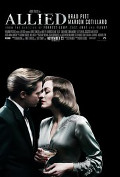
Directed by
Robert Zemeckis
124 minutes
Rated M
Reviewed by
Bernard Hemingway

Allied
Synopsis: In 1942, an intelligence officer, Max Vatan (Brad Pitt), is sent to North Africa to join a French Resistance fighter, Marianne Beauséjour (Marion Cotillard), on a deadly mission. They fall in love but their relationship is tested by the pressures of war.
Robert Zemeckis, an alumnus of the Steven Spielberg school of film-making, knows how to make a well-turned mainstream Hollywood movie. His biggest hit has been Forrest Gump (1994) but Back To The Future (1985) is a perennial that still entertains after multiple viewings. His films are accessible to a wide audience but, as we have seen with Cast Away (2000) and, more recently, The Walk (2015), they don’t skimp on intelligence, whether it be of subject matter or execution.
With Allied Zemeckis visits the WWII adventure romance genre that Hollywood did so well in the ‘40s and treats it with all the skill that you would expect of such an experienced craftsman. To this point the film begins in the genre’s most famous setting, Casablanca, and puts our two leads in a high intensity situation that is sure to generate emotional heat. This part of the film is a slight worry as one wonders if it is going to be another Mr & Mrs Smith (Pitt’s current marital problems only fuel the distraction) as Max and Marianne get up close and personal in a seductive array of period costumes and are framed by top drawer production design (aided by some rather fake-looking CGI) before accomplishing their mission with what one could only regard as excessive force. The effect feels like a kind of time warp, as if to meet our contemporary, more literal representations of screen sex and violence the old black-and-white imagery and low-fi sensibility of the older films had been subjected to a process of hyper-enhancement. Such is the downside of the Spielberg school.
Once the pair are re-united in Old Blighty as husband and wife, however, and the film’s main concern, the doubt about Marianne’s true identity, kicks in, things get substantially better. To some extent scriptwriter Steven Knight cheats with the Marianne character in order to keep the mystery alive but this is not inappropriate to the film’s style which after all is hardly realistic. Indeed, Knight himself has cleverly covered any caviling in this respect by having Marianne early in the film explain to Max that the success of her deceptions depends on her believing in them. Combine the resulting uncertainty with a well-cast Marion Cotillard’s as-ever fine acting and Max’s mission to discover the truth about his doe-eyed spouse holds our attention. Pitt is no Humphrey Bogart but here he plays your classically romantic screen hero with charm, cutting a fine figure in civvies, dashing in uniform, a dab hand at killing Nazis (he’s had plenty of experience in Inglourious Basterds, 2009, and Fury, 2014) and, of course, being a loving husband and father.
What’s perhaps most interesting about the film is its ending which, like Casablanca, occurs on an air-strip (there's also a piano scene in which the supposedly fluent-French speaking Max asks Marianne to play "The Mah-say-yez"). Whereas the latter film tied up its narrative with a famously altruistic yet wryly humorous resolution, Allied seems to reflect our post-romantic age in its tragic ending, a coda not dissimilar to that of the currently screening The Light Between Oceans that in the Hollywood tradition mollifies the gloom to some small extent. Indeed, if you enjoy classic Hollywood movies you should find plenty of satisfaction here.
Want something different?





